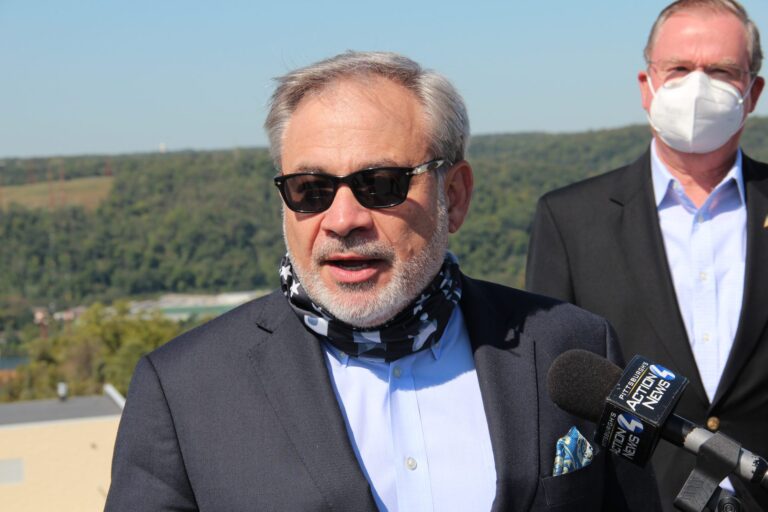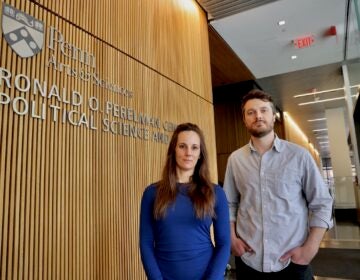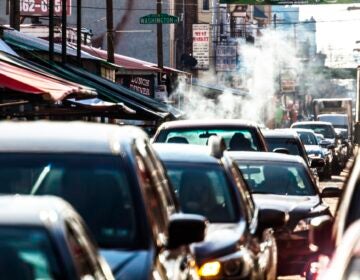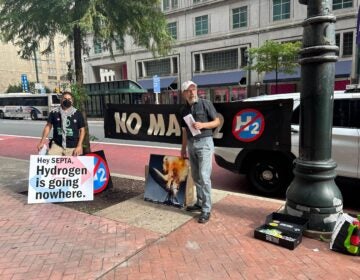Trump’s energy secretary questions mainstream science on human impacts of climate change
Scientists say human impacts are clear.

Department of Energy Secretary Dan Brouillette in Monaca, Pa. on Monday. (Reid R. Frazier / StateImpact Pennsylvania)
This story originally appeared on StateImpact Pennsylvania.
On a tour through Western Pennsylvania Monday, the Trump administration’s top energy official questioned the mainstream scientific consensus that humans are causing climate change.
Department of Energy Secretary Dan Brouillette made the remarks at a news conference touting Pennsylvania’s natural gas and petrochemical industry.
When asked how the Trump administration would fight climate change, Brouillette said:
“We have a lot to learn about what causes changes in the climate, and we’re not there yet.”
When asked to clarify whether he believed the scientific consensus that human-caused carbon emissions are fueling hotter temperatures, he said: “No one knows that.”
When told by a reporter that scientists say humans are causing climate change, he said:
“Scientists say a lot of things. I have scientists inside of the Department of Energy that say a lot of things. Look, the bottom line is we live here, so we must have some impact. The question is, what is the exact impact that we’re having? And that’s the question that has not been resolved.”
Brouillette’s trip included a tour of a chemical plant Shell is building west of Pittsburgh that will turn the region’s natural gas into plastic.
“We know a lot about carbon, we know a lot about carbon’s impact on various components of the environment. What we do not know is the exact impact that we’re having,” he said.
Scientists said Brouillette’s description of “what we know” about climate change is inaccurate and misleading.
“We know more than he’s suggesting in his statement,” said Paulina Jaramillo, a professor of engineering and public policy at Carnegie Mellon University.
“We know the scientific consensus is that human activity is causing climate change and that we’re already seeing the impacts on human and environmental systems.”
Scientists say that climate change is a contributing factor to the strength and frequency of events like heat waves, wildfires and hurricanes the country has recently experienced.
At current emissions rates, the world could reach irreversible levels of climate change by as early as 2030, according to the UN’s panel on climate change. The Trump administration has rolled back several major climate regulations installed by the Obama administration.
“There’s some uncertainty as to how bad things are going to get, but there is increasing evidence that they’re pretty bad,” Jaramillo said.
Saying “no one knows” how much climate change is caused by humans is “seeding doubt about what we know, that’s just not accurate,” she added.
Scientists have criticized Trump administration officials who cast doubt on the basics of climate change, a scientific phenomenon that has been well understood since at least the 1960s.
“If you don’t think humans are the dominant source of warming, you are making a statement that does not have a single factual or scientific leg to stand on. Yet leaders of science agencies are saying exactly that today. This is the world we live in,” Katherine Hayhoe, a climate scientist at Texas Tech, wrote on Twitter in 2018 in response to a NASA official’s comment that he couldn’t say if humans were the dominant cause of climate change.
Aaron Bernstein, interim director of The Center for Climate, Health, and the Global Environment at the Harvard T.H. Chan School of Public Health said in an email response to Brouillette’s comments:
“We cannot afford scientific ignorance and the spread of disinformation from our public leaders. At this very moment, in this country, people are dying because of climate change and from the air pollution that comes from burning fossil fuels.”
Speaking on the roof of a Hilton Garden Inn overlooking Shell’s chemical plant in Monaca, Pa., Brouillette praised the project, which the company is building with help from a $1.65 billion state tax credit.
“You’re looking at the future of the American economy right here,” he said. “This is where it all starts, with facilities and with infrastructure, just like this one.”
He said that fracking has allowed the country to become the world’s No. 1 producer of oil and gas, and allowed it to lower its emissions by switching electricity sources from coal to natural gas. He said petrochemicals like the plastics Shell will produce at its ethane cracker are also vital to the American economy.
“Today we’re buying hand sanitizer. The bottles that they come in are created by these types of facilities,” he said.
Brouillette is scheduled to meet with Pennsylvania labor leaders and participate in a live-streamed energy discussion with Carnegie Mellon officials on Tuesday.
WHYY is your source for fact-based, in-depth journalism and information. As a nonprofit organization, we rely on financial support from readers like you. Please give today.





